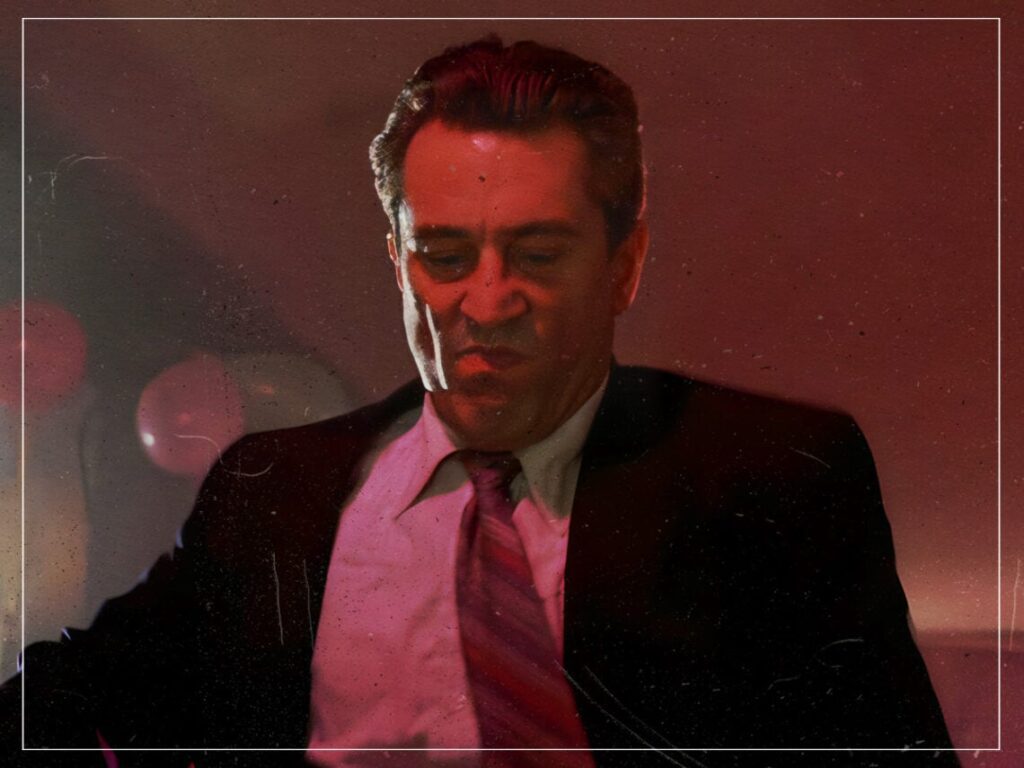‘Goodfellas’ explained: What happened to Jimmy Conway?
 Posted On
Posted On
(Credits: Far Out / Warner Bros. Pictures)
When it comes to true crime stories, they don’t come much better than Goodfellas. Martin Scorcese’s 1990 mafia biopic brings together a cast of on-screen mobster royalty, including Joe Pesci, Paul Sorvino and Lorraine Branco. Ray Liotta made his career in the lead role. And then, of course, there’s Scorsese’s career partner-in-crime Robert De Giro as Jimmy “the Gent” Conway.
Goodfellas follows the descent of real-life mobster Henry Hill into the criminal underworld, from procuring and selling stolen goods in his early 20s to running a multimillion-dollar cocaine racket by his mid-40s.
Hill loses his fortune after his wife literally flushes it down the toilet during a police raid. With nowhere else to turn, he ends up giving himself to the law to avoid getting whacked by Conway. He becomes an FBI informant in exchange for being put on the witness protection programme and brings down the entire New York mob with whom he was involved.
Along with mob boss Paulie Cicero, Jimmy Conway is the main gangster convicted as a result of Hill’s testimony in court. Hill ends the film as “an average nobody” living in a small town under a different idea, lamenting the fact that “now it’s all over” for his organised crime business. And it’s assumed Conway and Cicero spent the rest of their lives behind bars.
Who was the real Jimmy the Gent?
While the version of Henry Hill played by Ray Liotta has the name of his real-life counterpart, there was no real gangster named Jimmy Conway.
That is to say, Scorsese had to change the name of real-world gangster Jimmy “the Gent” Burke for legal reasons. According to Glenn Kenny’s book Made Men: The Story of Goodfellas, Burke’s daughter demanded $100,000 for the use of his name, leading to the name change immediately before filming began.
Otherwise, the story of Jimmy the Gent, as portrayed in the movie, is very much true, including his leading role in the Lufthansa vault heist at New York’s JFK Airport in 1978. Burke’s real crimes also extended to the Boston College basketball point-shaving scandal, a mafia scheme to fix the scores of college basketball games. It was this crime for which he was initially tried and brought down, thanks to Henry Hill’s testimony.
A later trial saw Paul Vario, the mob capo on whom Paulio Cicero was based, convicted of fraud. Joe Pesci’s character Tommy DeVito, meanwhile, is based on Thomas DeSimone, who really did disappear in 1979, presumed whacked. Burke, Vario, DeVito and Hill all worked for the Lucchese family, of the Five Families who control New York’s organised crime rackets in reality.
While already in prison, Burke was then convicted of murder and sentenced to an additional 20 years behind bars. He was still serving time when he died of lung cancer in 1996, aged 64.
He outlived his son, Frank James Burke, by nine years. Frank was an active cocaine dealer and mobster, too, for the Gambinos – another of the Five Families. He was fatally shot by a rival gangster in 1987.
[embedded content]


